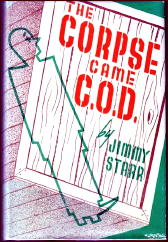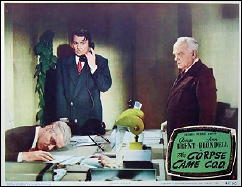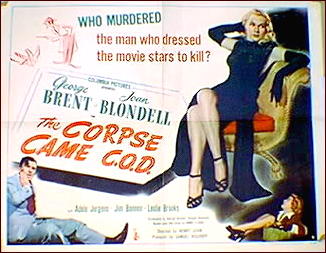Tue 17 Aug 2010
A Movie Review by David L. Vineyard: THE CORPSE CAME C.O.D. (1947).
Posted by Steve under Mystery movies , Reviews[2] Comments
THE CORPSE CAME C.O.D. Columbia Pictures, 1947. George Brent, Joan Blondell, Adele Jergens, Jim Bannon, Leslie Brooks, John Berks, Grant Mitchell, Marvin Miller, Una O’Connor. Screenplay by George Bricker and Dwight V. Babcock, based on the novel by Jimmy Starr (1944). Directed by Henry Levin.
— Reporter Rosemary Durant (Joan Blondell) to fellow reporter Joe Medford (George Brent).
When Hollywood jewelry and dress designer Hector Rose is murdered (shot at the studio, the sound covered up by a prison escape being filmed nearby), his body is shipped C.O.D. to the home of movie star Mona Harrison (Adele Jergens) whose numerological charts predicted a bad day, as she tells her butler, Fields.
[ It’s too small for you make it out otherwise, but that’s a book on numerology that she’s reading over there on the right. Trust me. — Steve.]
She also calls on wanna-be boyfriend Joe Medford (George Brent), a fast talking newspaper man who isn’t above playing fast and loose with the facts to get a scoop.
Joe calls in cop Lt. Wilson (Jim Bannon), who hangs around the studios, hoping the apparently starstruck detective will give Mona a break, while at the same time keeping some facts from him, like the dress fabric he saw Mona take from the packing case that contained Hector’s body.
Back at Palisades Studio Joe finds things complicated by fellow reporter Rosemary Durant (Joan Blondell) and a lot of people with something to hide.
Between flirting with every woman who crosses his path but Rosemary, Joe heads for Hector Rose’s home, still two steps ahead of the police, where he tussles with someone who leaves him unconscious and with Rose’s unconscious business manager on his hands just as Rosemary shows up.
Jimmy Starr who featured Joe Medford as a reporter sleuth in two other slightly hard-boiled screwball detective novels (Three Short Biers, 1945; Heads You Lose, 1950) was a Hollywood reporter (he’s even mentioned in the film’s opening, along with Heda Hopper and Louella Parsons).

The screenplay is co-written by Black Mask alumnus Dwight V. Babcock (Homicide Hannah), with direction by studio stalwart Henry Levin.
Joe spots Mona with Rudy Frasso (Marvin Miller), a tough guy who is “always around the clubs,” and who threatens Joe if he involves Mona. Meanwhile Joe is called back to the studio by studio head Mitchell Edwards (Grant Mitchell) where Rosemary is already prowling around in the dark.
Hector Rose was importing something from New York, maybe something worth dying for, and Joe and Rosemary both soon find themselves in the dark among the bolts of cloth in the studio costume department with someone with a gun looking for it. At which point Joe stumbles on yet another murder — this time of a studio executive, the Director of Publicity.
This is programmer fare, but with an attractive and capable cast. The humor is a bit forced at time, and Brent isn’t at his best (to see him handle this same kind of material much better, see Front Page Woman, with Bette Davis as his newspaper rival), but the film is still fun and moves quickly, and he gives a perfectly good performance.
It’s no great discovery, but well worth a little time and fun to watch the pros at work, especially Blondell, who brings what energy the film has to her rivalry/romance with Brent.
Joe: Alright, Butch.
Mildly screwball — it never quite rises to the occasion, but strays near it once or twice — and pleasant, the film is worth a small investment of your time as a minor but entertaining example of the comedy-
mystery form.
Joe gets clobbered (again) at the studio after a tussle with Rosemary over photos of the latest murder and wakes up in the infirmary where he and Rosemary decide to team up.

How many times have we heard that one in one of these?
Frasso turns out to have a past with Mona Harrison and Hector Rose, and an iffy criminal record including some shady dealings in the jewelry racket.
Mitchell Edwards: Let’s just say too cheap for my taste.
Back at Mona Harrison’s Rosemary gets to dope from her on her past marriage back in Denver while Joe examines the bolt of cloth she hid with a fortune in diamonds in it. Mona used to be married to a man who hates her now — maybe enough to frame her for murder, but she is too scared of him to say more.
Joe manages to lose the diamonds, but not before he figures out who done it, and closes in on the killer back at Mona Harrison’s place, about the least “least likely” suspect in the history of these things.
I’m not sure even Agatha Christie could have pulled this one off, but to be fair the clues are there if you look for them, which is more than many of these manage to do. Once you know who the killer is you can honestly look back and see where you had half a chance to figure it out if you were paying close attention.
The Corpse Came C.O.D. is no lost classic, but in the right mood it’s fast paced, fairly funny, and the mystery a bit better than average with some decent misdirection along the way.
I must say I found it generally more entertaining than I expected, and only wished the energy of the actors and the comedy had been as good as the mystery element — which is a unique complaint about a comedy-mystery from this era.

August 18th, 2010 at 10:07 pm
With the background of the writers who created this movie, this ought to be a good movie, and it sounds as though it is.
I was sure that this movie has played on TCM, but I suspect I’ve been thinking of the movie THE BRIDE CAME C.O.D. instead.
In any case I haven’t discovered any commercial release for this film, but I have found a copy on the collector-to-collector market — so in case anyone was wondering, it does exist!
August 18th, 2010 at 10:38 pm
Steve
This did play on TCM at least once, right before a BOSTON BLACKIE marathon.
It is entertaining, a bit flat, and not as funny as it aspires to be, but the mystery element is a bit stronger than usual, and there are a couple of very good red herrings and bits of misdirection, and even a couple of inconsistencies that turn out not to be so inconsistent after all when you know the truth. The ending is appreciably tough and well handled.
I don’t know if this was being pushed as a series for Brent and Blondell, but at the films end the two end of together and Brent turns down a studio job to stay on as a reporter which leads me to think if it had been more successful it might have spawned a series or at least a sequel.
There are a few comedy mysteries where the comedy and mystery elements are equal, but this is the only one I can think of where the mystery element is so much better than the comedy.
Brent had been around for a while when this was made, having costarred with everyone from Rin Tin Tin (in a serial no less) to Bette Davis and having played everything from the murderous doctor in THE SPIRAL STAIRCASE to Wild Bill Donovan in THE FIGHTING 69th.
As a teen Brent became a national hero in his native Ireland where he distinguished himself during the siege of the Dublin Post Office. I don’t think he ever played an Irish revolutionary in the movies though. I guess he wasn’t the ‘type.’
It must have been ironic for Babcock writing the script for this when you consider how close Blondel’s Rosemary is to his own Hannah in her two outings.